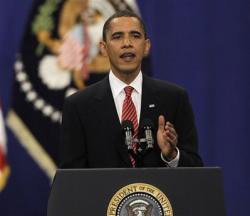
|  |  |  Americas & Beyond | December 2009 Americas & Beyond | December 2009  
Both Sides Unhappy with Obama's Afghan Plan
 Anne Flaherty & Anne Gearan - Associated Press Anne Flaherty & Anne Gearan - Associated Press
go to original
December 02, 2009


| | (Associated Press) |  |
Democrats are complaining about President Barack Obama's escalation of the war in Afghanistan and Republicans are unhappy with his promise to withdraw troops in 18 months, but Congress appears willing to approve the buildup's $30 billion price tag.

Lawmakers planned to use two days of high-profile hearings on the war, beginning Wednesday, to express their misgivings about the plan, which calls for a quick infusion of troops through July 2011, when the U.S. will begin to withdraw its forces.

Obama pledged Tuesday night to an audience of Army cadets at the U.S. Military Academy that the shift from surge to exit strategy would depend on the military situation in Afghanistan.

"We will execute this transition responsibly, taking into account conditions on the ground," Obama said, declaring that the nation's security was at stake and that the additional troops were needed to "bring this war to a successful conclusion."

Sen. Carl Levin, chairman of the Senate Armed Services Committee, which planned to grill top administration officials Wednesday on Obama's decision, said that he expected the administration to submit a new war spending request and that Democrats would back it.

"There's always going to be support for troops in the field," Levin said.

The planned infusion of 30,000 U.S. troops would raise the total American military presence in Afghanistan to about 100,000.

Many Democrats said they weren't convinced that sending more troops will hasten an end to the war. They also question whether the money used for troop deployments will drain resources from other domestic priorities, like health care and job creation.

Sen. Russ Feingold, D-Wis., called the plan "an expensive gamble to undertake armed nation-building on behalf of a corrupt government of questionable legitimacy."

At the same time, Republicans are wary that the 2011 date may be too firm and a signal to allies and the Taliban that the U.S. is not committed to the fight.

"The way that you win wars is to break the enemy's will, not to announce dates that you are leaving," said Arizona Sen. John McCain, the top Republican on the armed services panel and Obama's former campaign rival.

Despite the grousing from Congress, Obama's escalation strategy won quick backing from NATO allies. NATO Secretary-General Anders Fogh Rasmussen said he expected the allies to bolster the American buildup with 5,000 more troops.

French President Nicolas Sarkozy hailed Obama's speech as "courageous, determined and lucid" but stopped short of pledging additional French troops.

Davood Moradian, senior adviser to the Afghan Ministry of Foreign Affairs, said, "We want to thank the United States for its emphasis on having a long and comprehensive strategy for Afghanistan."

But he also warned that a troop surge in Afghanistan may not be as effective as the one in Iraq. "Afghanistan is not Iraq," he said. "Therefore, we have to be very careful about that."

After meeting Wednesday with Afghan President Hamid Karzai, U.S. Gen. Stanley McChrystal called Karzai's reaction to the new U.S. strategy "really positive. The president was very upbeat, very resolute this morning."

McChrystal, Obama's field commander in Afghanistan, said U.S. and NATO forces would hand over responsibility for the fight against the Taliban to Afghan security forces "as rapidly as conditions allow."

McChrystal had proposed a range of troop increase options to Obama earlier this fall as part of a broad review of the Afghan war strategy but warned that the U.S. was in danger of losing ground to insurgents if more troops were not sent.

Defense Undersecretary Michele Flournoy said Tuesday that major troop movements would begin early in 2010, with the bulk of the new forces in place by summer.

Doing so will be immensely complicated, she said in an interview, even though many of the forces will travel light and forces already on the ground will be working quickly to build housing and other infrastructure for the new arrivals.

The troop buildup will begin almost immediately, with the first Marines in place by Christmas.

"We must deny al-Qaida a safe haven," Obama said in articulating U.S. military goals for a war that has dragged on for eight years. "We must reverse the Taliban's momentum. ... And we must strengthen the capacity of Afghanistan's security forces and government."

The White House intends to cement Obama's message by flooding Congress with testimony from its top military and diplomatic advisers and dispatching them to meet with key U.S. allies.

Associated Press writers Slobodan Lekic in Brussels and Heidi Vogt in Kabul contributed to this report.
|

 |
|  |



